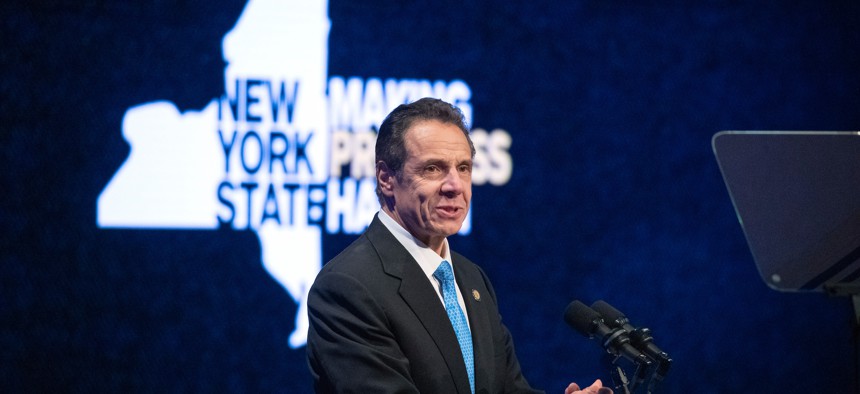State of the State addresses child welfare, homelessness and health care

New York Gov. Andrew Cuomo delivers his 2020 State of the State Address in Albany. Mike Groll / Office of Governor Andrew M. Cuomo
Nonprofits still have to wait to see what’s in store for state funding to social services, but Gov. Andrew Cuomo’s State of the State address on Wednesday provided key insight into what issues might be prioritized this year.
Child welfare: The governor has keyed in on reducing disparities in foster care and prioritizing family-based care. One initiative would encourage counties to implement a blind removal process when choosing to remove a child from their home, which would shield demographic information from officials making that decision. Another initiative would require localities to establish a Kin-First Firewall policy, which would require counties to make sure that all possible steps have been taken to ensure a child’s first placement is with relatives.
“This ‘firewall’ will guarantee counties exhaust all possibilities of kin-based care before placing a child elsewhere, which is proven to improve outcomes for young people in foster care,” CHAMPS-NY, a statewide coalition of advocates and child welfare organizations, said in a statement. It also called for the governor to expand the Family First Transition Fund to $4.5 million each year over the next two years.
Cuomo’s priorities also include expanding the Empire Child tax credit to apply to families with children under the age of four as well as boosting funding for after-school programs in high-need communities and pre-kindergarten.
Homelessness: Cuomo announced plans to invest the largest amount of state funding ever toward addressing homelessness, but didn’t note any figures. More details will come when he releases his budget proposal, though it should exceed last year’s budget, which put $20 billion toward affordable housing and homelessness. Otherwise, his agenda includes few specifics on homelessness. His agenda does mention a $5 million investment in permanent supportive housing for homeless veterans, which would be coupled with a $1 million investment to partner with organizations to prevent suicide among veterans and law enforcement.
Health care: Expanding the use of medication-assisted treatment for opioid abuse in emergency departments, mobile clinics and correctional facilities is among the governor’s health care priorities. However, some advocates are still smarting after he signed a bill that would remove some restrictions on accessing opioid treatment drugs for those with private insurance while vetoing a similar bill for those on Medicaid.
Among the other proposals floated by Gov. Cuomo during his address: a new grant program to help school districts with their mental health initiatives. Advocates expressed disappointment that mental health initiatives, specifically for youth, weren’t among his priorities.
“Children didn’t create the Medicaid deficit and the State should not attempt to resolve the deficit at their expense,” Jennifer March, executive director of Citizens’ Committee for Children of New York, and Kristin Morse, executive director at the Center for New York City Affairs at the New School, said in a statement on behalf of the Children’s Behavioral Health Campaign.
